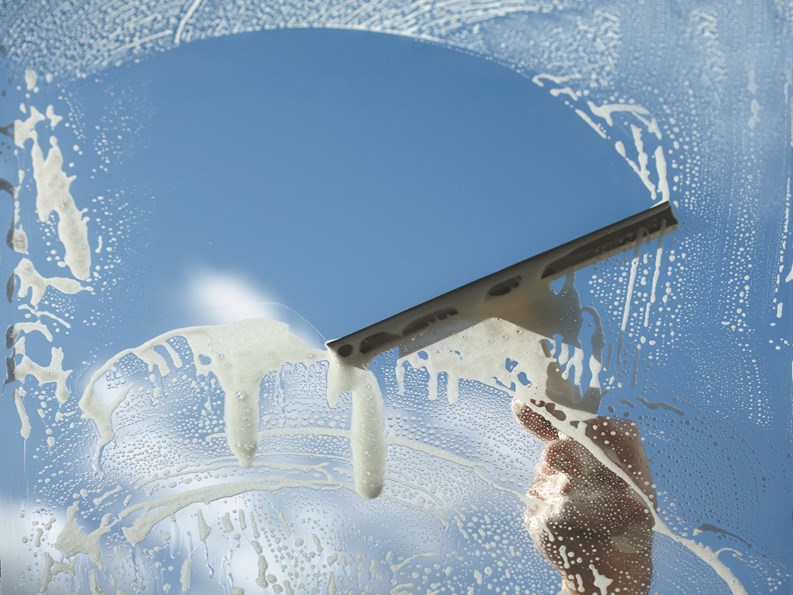Real estate brokers are nearly universal when it comes to touting properties with ‘tons of natural light,’ and nearly every apartment-hunter wants a room (or rooms) with a view. Windows let the light in, keep out the rain, and add value to units – as long as they’re kept clean and well-maintained, that is.
Depending on the size of a property, window cleaning can be a complex and involved endeavor. A high-rise, for example, can require a lot of logistical planning and compliance with applicable regulations to make sure workers are safe while scrubbing and passersby are safe while walking below. Scouring all of the glass in a sprawling townhome community may be less hazardous, but it can take forever.
In an effort to be efficient while keeping costs down and ensuring that the sun shines in, smart boards will have a window maintenance strategy ironed out well in advance of any weather-driven filth emergencies. A trusty vendor, good management, and general knowledge of seasonal variables are all essential to success.
The Basics
What makes a window filthy? And why and how often? Of course, the easy answer would be “dirt,” or even its counterpart, “debris,” but this is an issue worth parsing if an association wants to budget effectively to keep its windows clean throughout the year.
“The prime sources of grime are air pollution, wind, water, and sun,” says Yuriy Karpinskyy, President of Big Apple Window Cleaning in New York City. “Immediately after a cleaning, glass starts to accumulate dirt with each rain. Clarity goes away in two or three months, and after seven to nine months sans cleaning, any window in the city will be dirty, no matter who promises otherwise. Sure, there are special glass sealers that can keep glass clean for longer stretches, but most of them only work for 12 months tops, and it doesn’t guarantee that the glass will be 100 percent ‘clean.’ It will just be ‘cleaner.’”
In more suburban areas where residential buildings tend to be of the low-to-mid-rise persuasion, an association may be able to get away with more infrequent cleanings – but it still pays to be vigilant. “I have customers who love clean windows and balk at no expense, getting a deep clean as often as twice per year – but for the most part, people do it when they need to,” says Kevin Barrett, Founder of All Clean, which serves parts of Connecticut. “In our area in New England, I always advise them to do it at least once every couple of years. It’s not wildly expensive, nor is it cheap. It’s a business and we charge accordingly.”
When it comes to finding a responsible and affordable window cleaning vendor in the first place, Jill Wetmore, General Manager of the Boston-based Barkan Management Company, Inc., has some advice: “If you have access to a network of managers within your organization, it’s always a good idea to inquire with them first as to which company has worked out well – or not – for their respective properties. Further, when I need additional vendors for a specific project, I typically research the Community Associations Institute New England (CAI-NE) Resource Directory for vendors’ information. During your review process, I’d recommend you ask vendors for a list of references that you can use to reach out to find out how well they perform on site. Ask the reference if there were any troubles with scheduling or access, then find out how those issues were resolved.”
Safety First
Regardless of whether your community is a towering high-rise, a sprawling suburban development, or something in between, there are clearly delineated city/state/national rules and regulations to which both the association and any vendor must adhere when working on an exterior. It’s important to keep abreast of these to minimize risk of violation, fine, or worse.
“While there are no formal regulations on certification for window washers, to use a scaffolding you need to complete a 16-hour ‘Competent Person’ class, as well as the OSHA 10-hour construction class,” notes Karpinskyy. “While rope descent systems are not legal in New York, the Society of Professional Rope Access Technicians, and the Industrial Rope Access Trade Association can provide information where applicable. And there’s no formal training school or certification for getting outside a window and hanging there like a monkey to clean an apartment building. Any dude from the street can actually say, ‘I’m a window washer!’, then go do that – at the client’s risk. For that reason, we hire only people with no previous industry experience and then train them from scratch at our academy. That’s the only way that we can be sure that every person on our team has the requisite knowledge and skill. We are active members of the International Window Cleaning Association, and as such we certify our staff ourselves.”
And Barrett insists that boards and management take a close look any cleaning company’s insurance policy to make sure they’re adequately covered. “Make sure they have the proper liability insurance and workman’s comp,” he urges.
Cultivating a Rewarding Relationship
Vendors come in various shapes and sizes, and cater to associations that vary similarly. What works for a neighbor may not work for your property, even given similar circumstances. It helps to assess your specific needs and expectations, do some basic homework, and communicate clearly with all parties involved – vendors, residents, and community administrators, including boards and managers.
“The biggest issue we face when cleaning for condos, co-ops or HOAs is the communication between the management team and the tenants,” says Tom Stillwell, Operations Manager with Urban Street Window Works in Chicago. “We can work out a well-thought strategy with the management to clean a property, but if it isn’t communicated to the tenants, there will be problems. Residents need to know what’s going on, and what is expected from them. I’d also recommend that, when scheduling a cleaning, ensure that someone from management is on site [during the process] to address any issues.
“For example, we were once hired to clean a building with one side that was only accessible from a neighbor’s property. We told management that we’d need to work out that access in advance. On the day of the cleaning, we were on that neighboring property, and one of said neighbors yelled at us, asking that we leave. He said that he’d have had no problem granting us access had he known in advance. We brought this up with management, only to learn that they hadn’t seen any reason to even ask him for access to his property. We ended up not cleaning anything at all!”
It’s also important to have at least some understanding of window-washing techniques, to avoid your association getting nickel-and-dimed in the process. “You want someone who will actually be in front of the window while cleaning, using appropriate window-cleaning equipment,” says Barrett. “I’ve heard stories where some people just spray the window down from the outside and powerwash it; that’s not going to cut the mustard. You need to get out there in front of it, scrub it, do what’s necessary. Then you have these products that claim ‘just spray this on!’ Well, I don’t buy that slogan. And a cleaning service should have a website that makes it clear what they do, with testimonials and referrals. You’re dealing with people and coming to their home; you want to establish a rapport.”
And a board or management can take steps to stay informed on their own, whether parsing vendor websites for testimonials or staying abreast of pertinent exterior maintenance-related legislation. “While we want to be able to trust our vendors to do the right thing, we must always use our own best judgment,” acknowledges Wetmore. “Many governments and professional resources provide an opportunity to sign up to receive newsletters that then share updates to laws or regulations – so you can learn of any changes that may affect the proper management of your site.”
Mike Odenthal is a staff writer/reporter for The Chicagoland Cooperator.







Leave a Comment